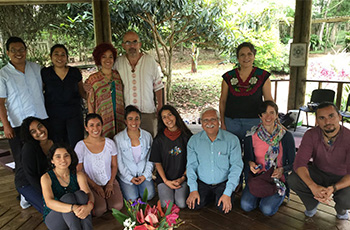Dr Rajesh Tandon is currently in Veracruz, where he is attending theTalloires Network Leaders Conference 2017. Prior to the conference, Dr Tandon visited the University of Veracruz’z Centre for Eco-Literacy & Dialogue of Knowledge’s, in Xalapa. Here, he engaged in conversations & exchange of ideas, approaches and experiences in participatory and collaborative research methodologies.
~Here’s a note from Dr Tandon, enumerating his reflections from the day:
"Located in a green hilly terrain at University of Veracruz at Xalapa is the Centre for Eco-Literacy & Dialogue of Knowledges. Welcomed by its coordinator, Helio, I walked through e truly ecological Centre. Mud & jute walls covered the classroom; circular open wood structure enabled a place for open deliberations; local herbal garden as lab for course on bio-medicine. This is the site for a Masters programme for the past decade.
Joining in the dialogue were colleagues from Institute of Educational Research, Gunther and his team, which has been using collaborative research in teacher training and curriculum development.
This Centre was started by a group of academics in the university after years of practice in indigenous culture, knowledge, music, dance and ceremonies. As one of the founders Enrique explained, the process of learning at the Centre is incorporating these methodologies. Mere rationality, what Incall instrumental rationality, is inadequate to broaden the epistemology of ecology. Both emotions and actions have to be given equal importance, along with cognition, if real practice of research and learning has to be undertaken. This is what this Centre epitomizes, and practices in everyday life and work.
Veracruz University is also a pioneer in starting centers of studies in four indigenous communities of the province. Called Inter-cultural centers of the university, local students relate with their indigenous communities to recover local knowledge and to identify locally needed projects at the suggestion of community. Learning of curriculum is thus localized, and pedagogy is engaged, lived-in.
I had the privilege to hear stories about these inter-cultural centers fromClaudia & Carlos of Tequila campus (which has won UNESCO recognition) and Julieta from Huazutlam campus at Selvas.
As I shared my own journey and the work of PRIA over the decades, I felt humbled by listening to such innovative and powerful examples.
Wish many other universities in India and elsewhere would take such risks and pursue profoundly relevant higher education or a better world for all.
Muchas gracias, campeneros, for such generosity.
~ Dr. Rajesh Tandon





